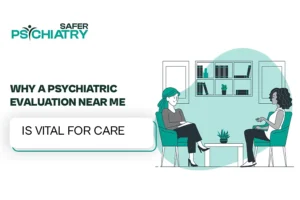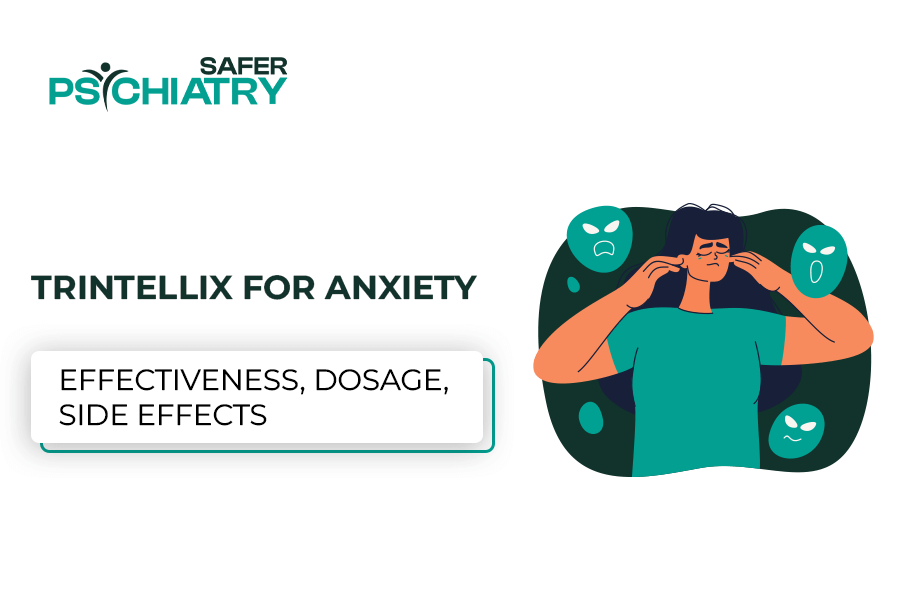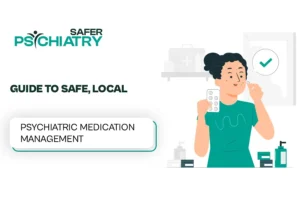
Trintellix for Anxiety - How Effective Is It
and What You Should Know
At Safer Psychiatry, we provide compassionate, evidence – based mental health care to support your well-being now and for the future – because your journey matters, and so do you.

Anxiety disorders are among the most common mental health conditions, often disrupting daily life, relationships, and work. While many medications are FDA-approved for anxiety, some people and providers look toward alternatives when first-line treatments don’t fully work.
Trintellix (vortioxetine), primarily approved for major depressive disorder (MDD), is sometimes prescribed off-label for anxiety. But how effective is it really, and is it the right choice for you?
Can You Use Trintellix for Anxiety?
Yes, Trintellix can be prescribed off-label for anxiety, even though it is not FDA-approved for any anxiety disorder. Psychiatrists may recommend it when:
- Anxiety occurs alongside major depression (MDD).
- Patients have not responded well to first-line SSRIs (like Lexapro or Zoloft).
- Severe generalized anxiety disorder (GAD) symptoms are present.
Important: Off-label use is legal and common in psychiatry, but it means the medication has not undergone full FDA approval for anxiety treatment.
How Effective Is Trintellix for Anxiety?
Unlike traditional antidepressants, Trintellix is a serotonin modulator and stimulator:
- Blocks reuptake of serotonin, like SSRIs (e.g., Prozac, Lexapro).
- Modulates serotonin receptors, balancing mood and cognition.
- Potential benefit: May improve focus and memory while reducing emotional distress.
This unique action makes it different from SSRIs and SNRIs often prescribed for anxiety.
How Trintellix Works in Anxiety
Unlike traditional antidepressants, Trintellix is a serotonin modulator and stimulator:
- Blocks reuptake of serotonin, like SSRIs (e.g., Prozac, Lexapro).
- Modulates serotonin receptors, balancing mood and cognition.
- Potential benefit: May improve focus and memory while reducing emotional distress.
This unique action makes it different from SSRIs and SNRIs often prescribed for anxiety.
Trintellix vs. Other Anxiety Medications
Many patients compare Trintellix to other antidepressants. Here’s how it stacks up:
- Trintellix vs. Lexapro: Lexapro is FDA-approved for anxiety; Trintellix may cause fewer sexual side effects.
- Trintellix vs. Prozac: Prozac has strong evidence for anxiety disorders; Trintellix may be gentler on cognition.
- Trintellix vs. Zoloft: Zoloft remains a first-line option for GAD and panic disorder.
- Trintellix vs. Cymbalta/Pristiq: These SNRIs are proven for anxiety; Trintellix may be considered if they’re not tolerated.
- Trintellix vs. Viibryd: Both are newer antidepressants; Trintellix tends to have fewer GI side effects.
What Can Be Added to Trintellix for Anxiety?
In some cases, psychiatrists may recommend combination strategies:
- Wellbutrin (bupropion): May boost energy and motivation.
- Buspirone: Sometimes used as an add-on specifically for anxiety.
- Therapy (CBT, DBT): Medication works best when paired with evidence-based psychotherapy.
Typical Trintellix Dosage for Anxiety
- Starting dose: 5–10 mg daily.
- Typical range: 10–20 mg daily (based on tolerance and response).
- Always adjusted by a psychiatrist depending on the individual’s needs.
Side Effects of Trintellix
Like all medications, Trintellix has possible side effects.
Common side effects:
- Nausea
- Dizziness
- Constipation or diarrhea
- Dry mouth
- Mild itching
- Sexual side effects (fewer than with SSRIs)
Less common but serious:
- Increased anxiety at the start
- Serotonin syndrome (rare, but dangerous)
- Increased risk of bleeding (especially with blood thinners)
Alternatives to Trintellix for Anxiety
If Trintellix doesn’t help, other options include:
- SSRIs: Lexapro, Prozac, Zoloft
- SNRIs: Effexor XR, Cymbalta
- Therapy: CBT, mindfulness-based therapy
- Lifestyle: Exercise, sleep optimization, stress management techniques
Final Thoughts
Trintellix can be a helpful off-label treatment for anxiety, especially if you also experience depression or haven’t responded well to other medications. While not FDA-approved for anxiety, research suggests it may reduce symptoms in certain individuals.
If you’re struggling with anxiety and wondering whether Trintellix could be right for you, it’s important to talk with a qualified psychiatrist.
At Safer Psychiatry, we provide personalized mental health care, exploring all treatment options, medication, therapy, or both, to find the plan that works best for you. Book a Free Consultation Today and take the first step toward calmer, healthier living.
Disclaimer: This article is for informational purposes only and does not substitute professional medical advice. Always consult your psychiatrist or healthcare provider before starting or changing medications.
FAQ
Frequently Asked Questions
Our Company
Copyright © 2024 Safer Psychiatric Consulting Services


